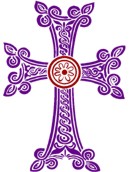Please note that the Armenian Apostolic Church, along with all Orthodox and Catholic Churches, recognizes the Deuterocanonical books (e.g., Wisdom of Solomon/Book of Wisdom, Tobit, Judith, 1 & 2 Maccabees, etc.) as Holy Scripture. Martin Luther, on the other hand, believed the Deuterocanonical books were not to be considered as fully the Inspired Word of God. He also viewed Hebrews, James, Jude, and the Book of Revelation in a similar light, and, in an unprecedented action, put them in a separate section at the end of his translation of the New Testament. Martin Luther wrote particularly harshly regarding James:
"In sum: he wished to guard against those who depended on faith without going on to works, but he had neither the spirit nor the thought nor the eloquence equal to the task. He does violence to Scripture, and so contradicts Paul and all Scripture. He tries to accomplish by emphasizing law what the apostles bring about by attracting men to love. I therefore refuse him a place among the writers of the true canon of my Bible." p.36 Luther, Martin. Martin Luther, Selections from His Writings. Ed. John Dillenberger. New York: Anchor Books, 1961.
Luther was referring particularly to James 2:24, "You see now that it is by deeds, and not only by believing, that someone is justified." [The New Jerusalem Bible].
Although modern day Protestants, as a whole, have reintegrated the New Testament Deuterocanonical books into their tradition of the Canon of Holy Scripture, Protestants have not reintegrated the Old Testament Deuterocanonical books.
Unfortunately, the Old Testament Deuterocanonical books are not included below due to technical reasons.

